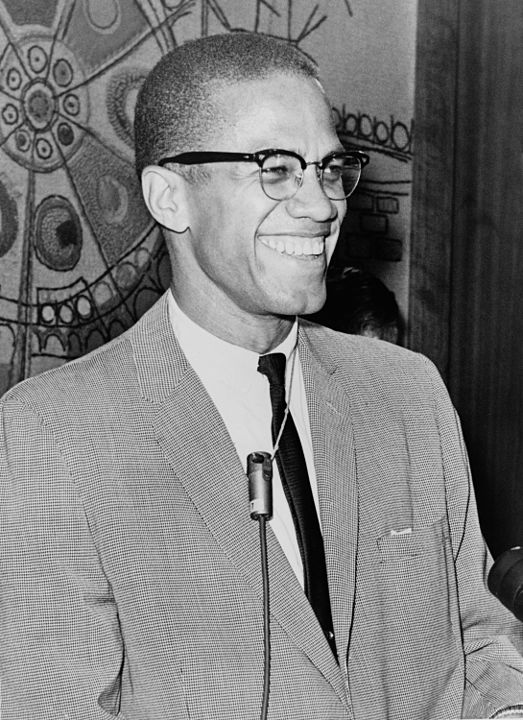
Malcolm X
Born: May 19, 1925
Died: February 21, 1965
Every human story begins at a defined point over which we have no control and takes off on a journey that can land somewhere surprising and even remarkable. In between liftoff and landing, our journeys intersect points that may seem improbable from either end. The young Malcolm Little of Omaha, Nebraska would take a trajectory no one—least of all he himself—could foresee. His father’s officially ruled accidental death was attached to lingering suspicions of a racial killing. His mother’s mental collapse propelled Malcolm and his siblings into foster care.
That such an unpromising beginning would lead to an international spotlight is unlikely. Malcolm pursued an education in prison, got religion and new resolve through the Nation of Islam, and dropped the “slavemaster” name of Little for the letter by which he would become famous.
In a generation of ascending Black leaders—Martin Luther King Jr. and Elijah Muhammad, on opposite ends of the political spectrum—and Black celebrities such as Muhammad Ali and James Baldwin, Malcolm X was the sort of leader who made white listeners, and some in the Black community, anxious with his racially separatist and often incendiary rhetoric.
Malcolm X was still on an arc of political development when he was assassinated at the age of 39. By then he’d left the Nation of Islam to become a Sunni Muslim. Although scornful in the past of civil rights leaders who operated in the pacifist tradition, Malcolm X met with King in the last year of his life, hoping to create a coalition of Black activism to effect change. His association with white Muslims had led him to consider that racism might not find its only solution in separatism but might be overcome in the mutual fight for justice.
After Malcolm X was gunned down, King wrote to his widow that he viewed him as a promising leader who “had the great ability to put his finger on the existence and root of the problem.” Although they disagreed mightily on the methods of social change, King never doubted that Malcolm X sincerely struggled to discover a spiritual vision for the problems of his race and for the human race.
More about Malcolm X:
This political season, listen to the words of Malcolm X
In both Malcolm X's teachings and scripture, a reminder to seek the truth, no matter where.
Image: Ed Ford, Library of Congress, New York World-Telegram & Sun Collection, Public Domain, via Wikimedia Commons








